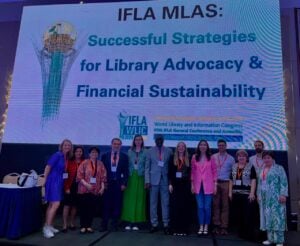Report from MLAS Open Session @ WLIC 2025: Successful Strategies for Library Advocacy and Financial Sustainability
16 September 2025
Building on the MLAS news item summarizing MLAS activities at the World Library and Information Congress 2025, here is a more detailed report graciously written by Helen Voldner, President of the Norwegian Library Association and a member of the IFLA MLAS.

IFLA WLIC 2025 – Open Session Report
Title: Successful Strategies for Library Advocacy and Financial Sustainability
Date: Tuesday, August 19, 2025
Time: 09:00–10:15
Location: Grand Ballroom, Hilton
Organizer: IFLA Management of Library Associations Section (MLAS)
Coordinator: Loida Garcia Febo (USA), IFLA MLAS Chair
Co-Chairs of the Open Session: Loy Jyoon Chin (Malaysia), IFLA MLAS Secretary, and Marwa El Sahn (Egypt), IFLA MLAS Member, Centre d’Activités Francophones (CAF), Bibliotheca Alexandrina
This seminar, hosted by MLAS, addressed key challenges and opportunities related to library
advocacy and financial sustainability. The session attracted a diverse and engaged audience,
reflecting the relevance of the topic across regions and association types.
The program featured four presentations: an introduction to MLAS’s new advocacy
evaluation framework, a summary of regional needs and solutions from MLAS’s webinar
series, and two case studies from Malaysia and the United States. These contributions
provided both strategic insights and practical examples, followed by an interactive discussion
that encouraged peer exchange and reflection.
Presentation Highlights
MLAS Advocacy Impact Evaluation Project
Presented by Antoine Torrens-Montebello (France), Director of City Libraries of Compiègne.
This presentation introduced a new evaluation framework developed by MLAS to help library
associations assess and enhance their advocacy efforts. The tool includes indicators for
visibility, political engagement, and community impact, and supports strategic planning and
continuous improvement. The presentation emphasized the importance of data-driven
advocacy and encouraged associations to adopt the framework to better measure and
communicate their influence.
Building Strong Library Associations: Regional Needs and Solutions
Presented by Imad Bachir, The American University of Iraq Baghdad (AUIB), Lebanon. This
presentation summarized findings from MLAS’s webinar series, which gathered input from
library associations across different regions. Key themes included the need for tailored
advocacy strategies, capacity building, and support for associations operating in resource-
constrained environments. The presentation highlighted regional diversity in challenges and
emphasized the importance of context-sensitive solutions and peer learning.
Case Study: Librarians Association of Malaysia
Loy Jyoon Chin presented Malaysia’s approach to building a financially resilient association.
Key strategies included diversifying income sources (e.g., training, consultancy, membership
fees), aligning financial planning with strategic goals, investing in leadership development,
and leveraging digital tools to improve efficiency and outreach. The case demonstrated how
adaptive leadership and innovation can foster long-term sustainability.
Case Study: American Library Association (ALA)
Michael Dowling shared ALA’s experience with organizational transformation and financial
diversification. ALA has developed multiple revenue streams, including publishing,
conferences, and grants, and has restructured its governance to improve transparency and agility. The association’s strong advocacy infrastructure and member engagement initiatives have helped maintain its relevance and impact in a complex environment.
Closing Discussion
The seminar concluded with an interactive discussion centered on three questions:
What successful strategies have associations used for membership retention and
financial sustainability?
How can associations collaborate more effectively across regions to strengthen
advocacy?
What practical steps can smaller associations take to increase their advocacy
impact?
Participants shared insights and experiences, highlighting the value of peer learning, regional
cooperation, and scalable models. The discussion reinforced the relevance of the presented
strategies and encouraged continued collaboration among library associations globally.
Conclusion
The session provided valuable tools, case studies, and reflections that can support library
associations in their advocacy and sustainability efforts. MLAS encourages ongoing dialogue
and the use of shared resources to strengthen the global library community.